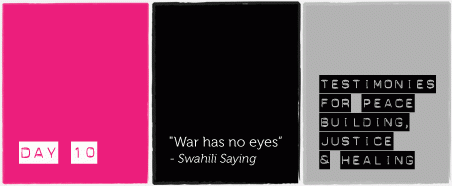
Watch the full video here. Video from JUPEDEC and the Women's Initiatives for Gender Justice in collaboration with WITNESS.
Our Voices Matter features interviews with women victims/survivors of rape and other forms of sexual violence from North Kivu, South Kivu and Province Orientale. Through their testimonies, this advocacy film highlights the multiplicity of perpetrators operating in Eastern Democratic Republic of the Congo (DRC), the lack of accountability for these crimes, and the medical services, psychosocial assistance and economic support urgently needed by victims/survivors.
Giving testimony to acts of violence is a courageous choice. As a survivor, bearing witness for the many thousands who have experienced similar violations gives voice to those who cannot speak. It brings alive the experiences of those who have died, and gives some healing to the one who speaks out. For women in situations of armed conflict, the rape and terror are sometimes not an isolated incident but can continue for years through abduction, forced marriage and enslavement to military forces.
Today we feature the voices of survivors in the DRC and Central African Republic (CAR), and the organisations that assist in documenting voices, working to provide psycho-social support and walking the road to justice for women through bringing cases to the International Criminal Court.
Listen to their testimonies. Stand witness with them. Amplify their stories and collectively demand for justice and peace.
------
Gender based violence, conflict and peace building in the DRC
The Democratic Republic of Congo (DRC) has one of the most serious incidence of gender based violence and human rights violations in the world. The DRC was until recently, a county emerging from years of armed conflict which has perpetuated rape and sexual violence as a weapon of war. DRC's capital city of Kinshasa was dubbed the “capital of rape” by the UN special rapporteur Margot Wallström. In South Kivu alone 54,000 cases of rape were reported in the first six months of 2010. According to an Al Jazeera report, one commonly quoted statistic in DRC is that there are about 400 rapes a day.
The DRC government has signed onto various commitments to eliminate gender-based violence including signing on to the UN Convention on the Elimination of Discrimination against Women CEDAW and the special Protocal to the African Charter on Human and People's Rights on the Rights of Women in Africa (Maputo Protocal).
The DRC has also enacted national laws in the form of family and criminal codes and sexual violence acts which provide protection for women and girls against violence. However, these provisions are often not enforced.
We recognise that the war in the DRC is reignited. On 20 November 2012, the city of Goma, capital of the North Kivu province in the Eastern Democratic Republic of the Congo (DRC), was overtaken by the Mouvement du 23 Mars (M23) militia group.
You can read more at the AWID website which has collected news and analysis, statements and press releases, and action appeals that call attention to the situation.
On 15 November 2012, the Women's Initiatives for Gender Justice launched the Gender Report Card on the International Criminal Court 2012 which highlights important events and trends in the institutional development and substantive work of the ICC over the past 12 months.
------
"Women have died in the bush, and others keep on suffering as I am talking to you. I am asking the International Criminal Court to have Joseph Kony and his officers arrested. They should be brought to justice to answer for what they’ve done, for the sufferings and losses, and the blood, which was spilled in the Central African Republic." - Nanzouno-Dadine Lea from “Our Plea” produced by JUPEDEC, WIGJ & WITNESS
Because of the extent of our suffering, I can no longer keep silent. […] We ask you to be the voice and the light of those who suffered […] and stand with us.” - Oyela Irene from “No Longer Silent” produced by Greater North Women’s Voices for Peace Network, WIGJ & WITNESS
Help keep the activism of organisations working towards peace and justice for women in situations of armed conflict alive. Send messages of support and solidarity. Share your dreams for a conflict free world with gender justice as a non-negotiable.
Build knowledge.
Read more about the work of our partner organisations in this area:
- Women's Initiatives for Gender Justice
- Si Jeunesse Savait (SJS)
- Isis WICCE research documenting women’s experiences of armed conflict in the Central African Republic
Take action:
- Distribute the Women's Initiatives' Gender Report Card 2012.
- Help document or share cases of technology-related VAW on the Take Back the Tech! DRC map managed by SJS
- Find out more about the situation in Eastern DRC and help spread the word. Follow the Women's Initiative on Twitter @4GenderJustice
- Support SJS and Isis WICCE on Facebook by growing the numbers and posting messages of support.
- Advocate with donors for direct support and funding for grassroots women's rights and peace organisations working in armed conflict situations.
- Urge the UN and governments to implement the Security Council Resolutions on women, peace and security and ensure women are involved in peace talks and conflict resolutions initiatives.
- Advocate for the prosecution of sexual violence crimes in your country, along with anti-violence education programmes and the provision of support services to victims/survivors.
- Advocate for your government to ratify the Rome Statute and become a States Party to the International Criminal Court. For more information about ratifications see: www.iccnow.org
- Find out about the work of the ICC: Women's Initiatives for Gender Justice
Take Back the Tech! Collectively take action towards peace, gender justice and non-violence.
- Log in to post comments

